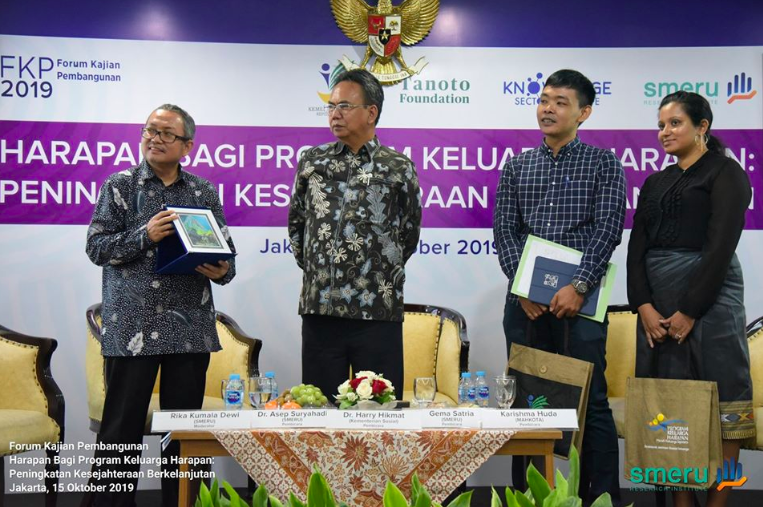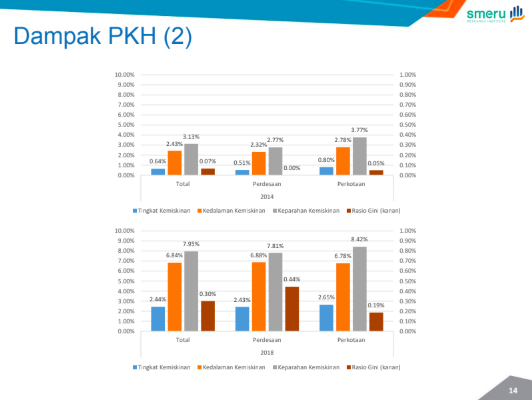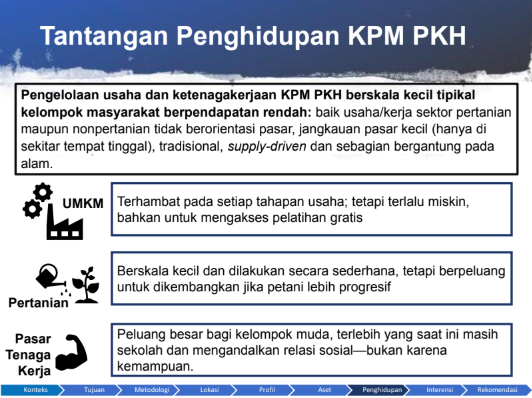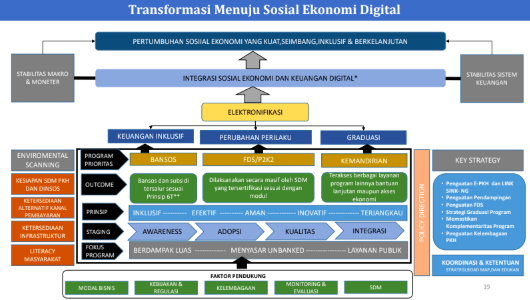Indonesia’s conditional cash transfer program, also known as Program Keluarga Harapan (PKH) is one of the efforts made by the government to eradicate poverty. In another FKP event hosted by The SMERU Research Institute, the impacts, dynamics, and possible improvements of PKH were discussed. The event was held at the Ministry of Social Affairs on Tuesday, 15 October 2019. The speakers were Asep Suryahadi (The SMERU Research Institute), Gema Satria (The SMERU Research Institute) and Karishma Huda (MAHKOTA), Harry Hikmat (Ministry of Social Affairs, Republic of Indonesia).
Opening the session, Asep Suryahadi presented his study on the impacts cash transfer programs on poverty and inequality in Indonesia. First, using The National Socioeconomic Survey and the Village Potential Statistics (PODES), Asep conducted a Propensity Score Matching approach to estimate counterfactual indicators of poverty and inequality if households were not to participate in PKH. The study found that PKH has contributed to reducing poverty, especially the depth and severity of poverty, but did not contribute to reduce inequality. PKH’s contribution to poverty reduction increased from 2014 to 2018 in line with the increasing coverage of program. Next, Asep sought to answer whether there was any negative behavioral response from recipients of the cash assistance. In this study, Asep analyzed the impacts of Indonesia’s unconditional cash transfer program (Bantuan Langsung Tunai, or BLT), which was introduced in 2005 for the poor and vulnerable. Using the Indonesian Family Life Survey, Asep matched individuals using the Coarsened Exact Matching (CEM) method. This study did not find any evidence that unconditional cash transfers have any significant impacts on the behaviors of beneficiaries, whether negatively or positively.
Next, Gema Satria and Karishma Huda presented a joint study conducted by The SMERU Research Institute and MAHKOTA to identify interventions for the livelihood of PKH household beneficiaries. The study was conducted in West Bandung, Indramayu, Pacitan, and Surakarta, and involved 201 PKH households and 883 household members. This study was conducted using both quantitative (e.g. household survey) and qualitative (e.g. focus group discussions, in-depth interviews, literature review) methods. This study found that interventions regarding the livelihood of PKH beneficiaries need to include the whole household, as opposed to just an individual. In addition, businesses run by PKH beneficiaries need to be driven by demand, because PKH households often produce goods but cannot find markets or sell them and end up selling them to exploitative middlemen. Beneficiaries also do not have enough access to trainings, especially on business skills.
Lastly, Harry Hikmat presented the roadmap of the development of PKH. The government has targeted a poverty rate of around 6.4-7%, a Gini ratio of 0.370-0.374, and an economic growth of 5.4-6% by 2024. With that in mind, the government has a number of challenges to overcome, such as inadequate procedural capacity, funds, and access to basic services for managing social assistance in remote areas, the lack of innovative approaches and training methods to change the behaviors of beneficiaries, and the need to develop a new system of the distribution of funds/assistance, among others. For the 2020-2024 period, the government focuses on six mains points, namely strengthening of PKH’s Information Management System (MIS) and the linkage to the Integrated Database Collection (BDT) or Social Welfare Information System (SIKS), strengthening the quality of facilitation sessions and/or facilitators, strengthening the Family Development Sessions (FDS), designing an exit/graduation strategy for beneficiaries, making sure that PKH is complementary to other government programs, and improving the institutional quality of PKH.
For the complete presentation and Q&A session, please refer to the video and materials provided.








